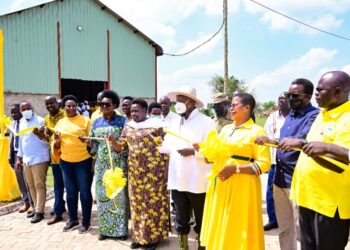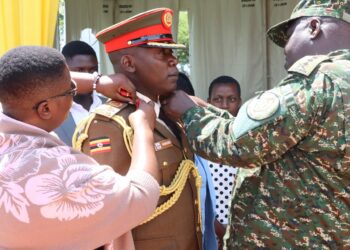On a normal day, Montepuez, a town in the northern Cabo Delgado province of Mozambique, is a quiet settlement with its residents going about their work in the gardens or nearby mines. Saturday 19th, however, was no normal day. By 7am, the streets were teeming with hundreds of excited people, many carrying the Mozambican and Ugandan flags, singing and dancing.
Next to the Basic Military Training Centre of Montepuez, tens of cultural and dance groups each conducted their performances, filling the air with a cacophony of sound. Nearby, a military band went about practicing the Uganda national anthem. Mozambique’s National Defence Minister Atanasio Mtumuke could be seen pacing about, ensuring everything was in order.
With each passing hour, the numbers of residents in the streets kept swelling, so did the excitement. The town awaited an important guest. Marcelino Gurufu, a taxi driver, asked why he had abandoned his day’s business to join the crowds, said, “Museveni is a son of Montepuez. We are glad that 40 years after we raised him, he is returning to visit us.”
At exactly midday, the first of three helicopters carrying President Yoweri Museveni and his entourage touched down at the open ground that serves as a training space for soldiers. As the President, accompanied by his daughter Natasha Karugire, alighted from the chopper, the crowd went into frenzy, cheering and ululating. Security men had to keep pushing the surging crowds.
Walk down memory lane
Acknowledging the crowds, President Museveni walked for about a kilometre, ignoring the official car provided for him, to the entry of the barracks where he first lay a wreath on a monument built in memory of fallen officers and men of the Mozambican army.
He was then conducted around the barracks, which between 1976-78, served as home and school for 27 young men he had identified and sneaked into Mozambique for military training ahead of plans to wage full-scale war against the Idi Amin dictatorship.
This would turn into the nucleus of the Front for National Salvation (FRONASA), that would between 1981 to 1994 become the National Resistance Army before being renamed the Uganda Peoples Defence Forces (UPDF) during the 1993 Constitution-making process.
At hand to receive him at Montepuez were the surviving three of this group; Gen Caleb Akandwanaho aka Salim Saleh, a Senior Presidential Adviser and Coordinator of the Operation Wealth Creation (OWC) programme, Lt. Gen. Ivan Koreta, an Army MP and Col Bosco Omure, who oversees special duties in northern Uganda under the Internal Security Organisation and also coordinates OWC in Lango.
As the clouds, which had earlier formed and threatened to rain cleared, giving way to a bright sunny afternoon, President Museveni was conducted around, touring the dormitory where his 27 fighters lived, the canteen where they were served food, and he signed the visitors book at a historic spot between two gigantic trees—where in the 1970s—he sat with Mozambican liberation icon Samora Machel and other leaders to plan their activities.
Shortly after, President Museveni was led to the square, where he awarded medals to veterans who directly supported the Ugandan trainees, while others were recognized post-humously and their medals received by family members. Among those recognised were Juliao Chissico Francisco, a driver and Luis Manuel, a cook.
How it all started
Addressing the attentive crowd that would occasionally break into cheer, President Museveni explained the origin of the Montepuez mission.
“Your brother country Uganda had a lot of political problems. To get the picture of how your brothers suffered, you are told that between 1966 to 1986, a total of 800,000 Ugandans had died because of the governments killing them,” said the President. “The economy had collapsed and over 500,000 Ugandans were living in exile.”
He continued, “So, when Comrade Samora and Mwalimu Julius Nyerere agreed to help us in 1971, it was to rescue your Ugandan brothers and sisters who had no hope anymore. We made several attempts between 1971-74 to dislodge Amin but we failed. Like Mao Tse Tung says, making a revolution is not a tea party.”
He noted that after Mozambique gained independence in 1975 from the Portuguese, Samora Machel, a year later, on the intercession of Mwalimu Nyerere, offered FRONASA a training base in Montepuez.
“This (square) was our training centre. I was staying in a house near here while the youth were staying in the dormitory. This group of 28 turned out to be more useful than the others who we had been trying to train since 1971. They formed the nucleus of our army,” said the President, who told his audience that by the time Amin fell in April 1979, the Montepuez group had recruited and trained upto 9,000 other fighters.
“Although the politics of Uganda did not stabilize immediately, this nucleus made us autonomous in military affairs. Thereafter we could do things by ourselves. So, when you hear that the UPDF is in Somalia or Central African Republic and doing a good job, know that the nucleus was here in Montepuez,” he said, to rousing cheers from the crowd.
President Museveni, who had been in Mozambique for a three-day state visit on invitation of his counterpart, Jacinto Nyusi, said he had discussed and sought permission of his host to allow the Uganda government set up a technical school in Montepuez as a token of appreciation. He added that a dormitory or lecture theatre would be built inside the barracks to solidify the two countries’ brotherhood.
Noting that only four of the 28 fighters were alive, whom he introduced to the gathering, President Museveni warned the youths and young soldiers against risky lifestyles, saying most of their comrades did not actually die due to war but risky behaviour.
The President revealed that together with his three colleagues, they had decided to initiate a poultry project for the Montepuez veterans to boost their incomes. The project, said Mr Museveni, would be integrated with a crop farming initiative to manage costs. He offered $26,000 (about Shs90m) to kickstart the project.
“Mozambican veterans showed us how to defeat the Portuguese. In Uganda, we veterans showed how to defeat bad governments. We must then show our people how to get out of poverty. Revolutionaries must show collaborators how to get out of poverty,” he concluded.
Gifts and honours
Host Defence Minister Mtumuke in his remarks thanked President Museveni for remembering his revolutionary roots and retracing them. He announced that the barracks President Museveni had visited would be preserved as a “Museveni Museum” to promote solidarity of the two countries’ armies.
Earlier, Ms Etelvina Fevereiro, an administrator of Cabo Delgado Province and Mr Antonio Domingos Mapure, representing the region’s permanent secretary, awarded President Museveni gifts including a walking stick, a hat, while Mrs Karugire was given a blouse.
Later, President Museveni, whose Montepuez tour was the final activity of this state visit, was seen off at Pemba International Airport by the host agriculture minister Francisco Marrule and a host of Ugandan officials including Veteran Affairs Minister Bright Rwamirama and Ambassador Richard Kabonero.
On what it feels like being back in Montepuez after 40 years)
Gen Salim Saleh
“I am both happy to be here after all these years but again, I am unhappy that it is only four of us who are alive today. I would have wished that all my comrades were present today to celebrate this milestone with us.”
Lt Gen Ivan Koreta
“I feel elated being back here. It feels good, especially meeting the veterans, and others who supported us. Also, not much has really changed here in the barracks.”
Col Bosco Omure
Our training in Montepuez taught us to fight injustice anywhere. At times when I am watching international news and I see what I think is injustice in a foreign country, I feel like going there to fight that injustice. This place made us freedom fighters and revolutionaries. I am happy to be back and trace my roots.
Do you have a story in your community or an opinion to share with us: Email us at editorial@watchdoguganda.com











